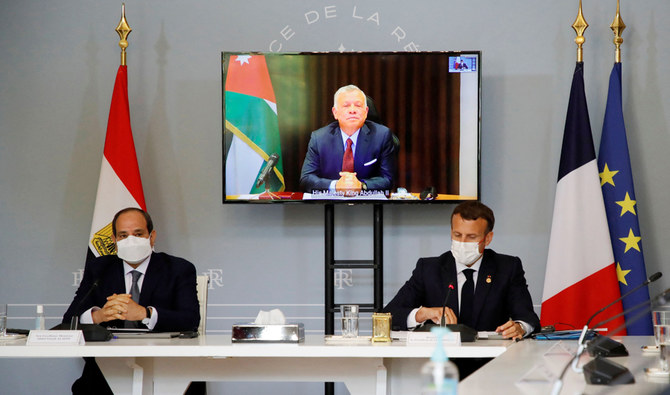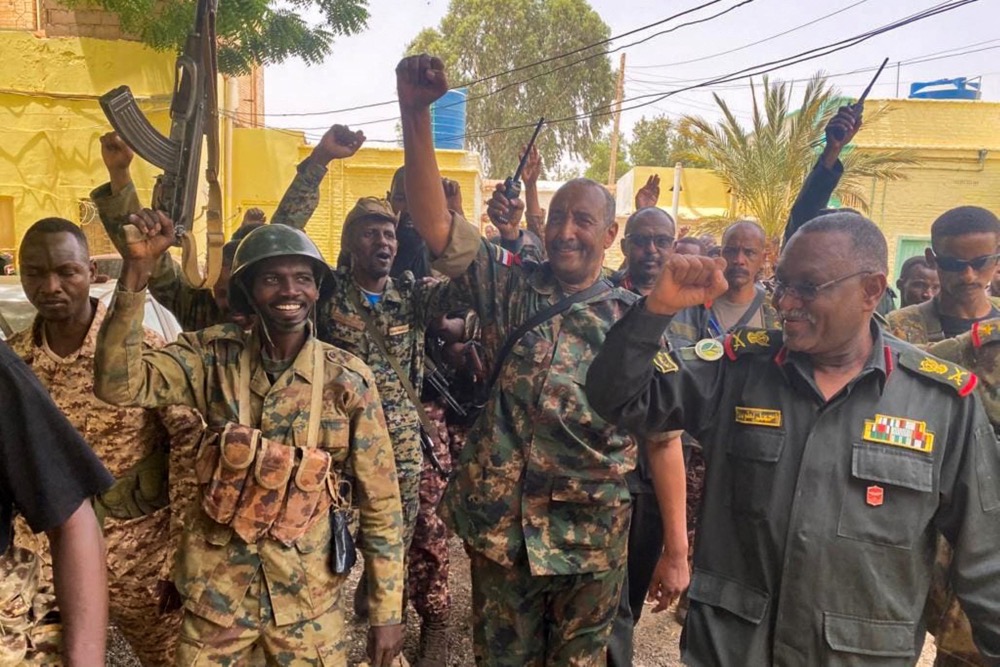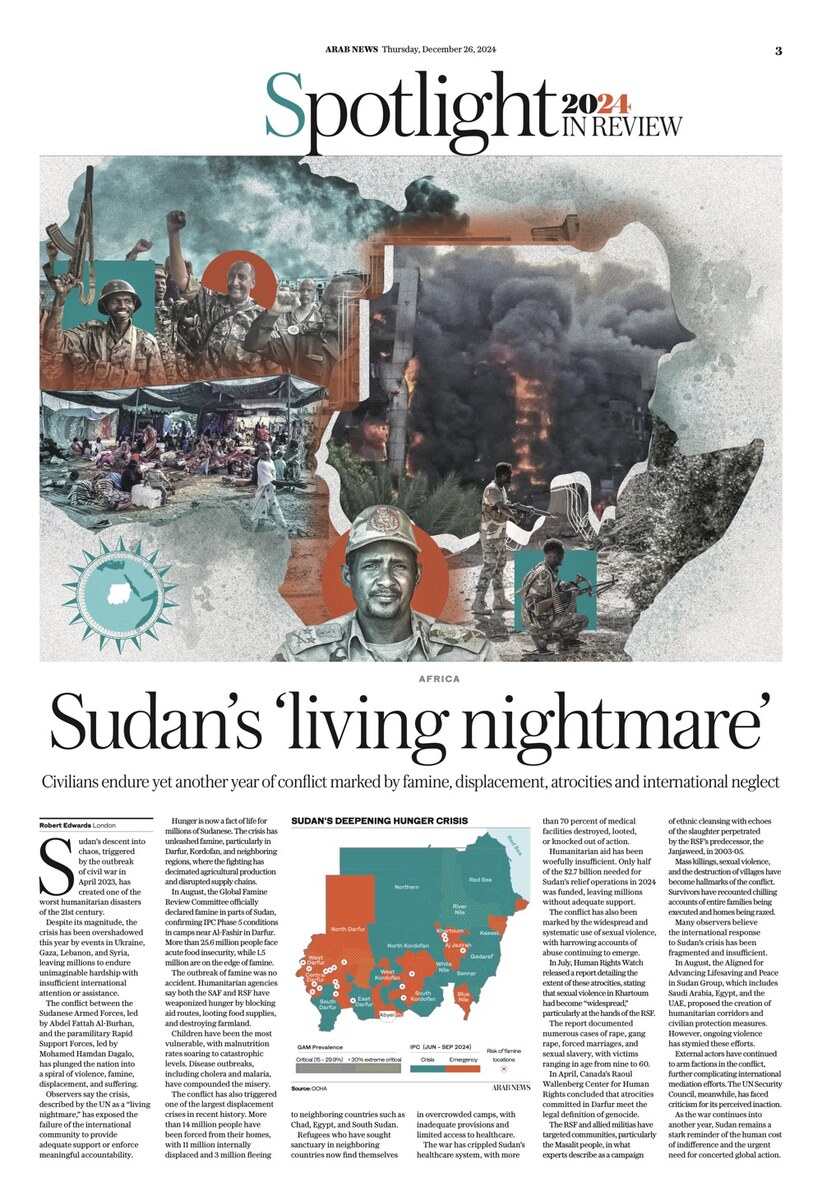UNITED NATIONS: China’s UN ambassador says France is seeking a UN Security Council resolution calling for a cease-fire between Israel and Palestinian militants who control Gaza.
Zhang Jun, the current council president, confirmed that France’s UN Ambassador Nicolas De Riviere informed the council during the third round of closed consultations Tuesday on the conflict that a resolution was being prepared.
The United States has blocked the UN’s most powerful body, which is charged with maintaining international peace and security, from issuing a press statement calling for a halt to the violence, insisting that it would not help diplomatic efforts to end the conflict between Israel and Hamas.
Diplomats said the 14 other council members supported the statement proposed by China, Tunisia and Norway. But Security Council press and presidential statements require approval of all 15 members. Resolutions, which are legally binding, do not. They require at least nine “yes” votes and no veto by a permanent member. This would put the United States in the position of voting in favor, abstaining, or vetoing a cease-fire call.
Zhang told reporters that China, Tunisia and Norway “haven’t given up our effort ... and that draft statement stays there on the table, and we will continue to make our effort, making sure that the Security Council is fulfilling its mandate and responsibilities.”
He said US President Joe Biden’s support for a cease-fire is “consistent with what we are proposing in the Security Council,” and China will support “all efforts facilitating the cease-fire, facilitating the ending of the crisis, and the coming back of peace in the Middle East.”
The proposed French resolution, drafted in coordination with Egypt and Jordan, could be circulated to council members as early as Wednesday and put to a quick vote, diplomats said, speaking on condition of anonymity because discussions were private.
UNITED NATIONS — The Palestinian ambassador to the United Nations is challenging the Biden administration to show results from its diplomatic efforts to achieve a cease-fire between Israel and Gaza’s militant Hamas rulers, pointing to the US repeatedly blocking UN Security Council action on grounds it would interfere with its diplomatic efforts.
Riyad Mansour said “if the Biden administration can exert all of their pressure to bring an end to the aggression against our people, nobody is going to stand in their way.”
But he said the facts speak for themselves, and nobody has succeeded yet, so the US argument that a council statement would interfere with efforts to achieve a cease-fire “does not hold water.”
Mansour spoke at a press conference Tuesday as the Security Council again met in closed consultations at the request of China, Norway and Tunisia who have been pressing for the UN’s most powerful body to respond to the Gaza conflict, now in its second week. But council diplomats, speaking on condition of anonymity because the discussion was private, said the United States reiterated again that a statement would not help diplomatic efforts despite the 14 other members calling for council action.
JERUSALEM — Israeli Prime Minister Benjamin Netanyahu says Palestinian militants have been dealt “unexpected blows” in more than a week of Israeli bombardments in the Gaza Strip.
Netanyahu’s office released a video of the prime minister speaking in front of an F-16 fighter jet at an air force base in southern Israel on Tuesday.
“I have no doubt that we set them back many years,” Netanyahu said. “I am sure that all our enemies around us see the price we have levied for the aggression against us, and I am sure they will learn the lesson.”
BEIRUT — Scores of Palestinians and Lebanese protesting along the border with Israel threw rocks and climbed the cement wall snaking around the frontier, and drew tear gas from Israeli forces Tuesday.
Lebanon’s National News Agency said five people were injured and others suffered from smoke inhalation. A number of protesters in the Lebanese border village of Adaisseh had climbed the wall to plant Lebanese flags and the yellow flags of the militant Hezbollah group.
It was the fifth straight day of protests along the border as support for the Palestinians swelled against an Israeli military campaign in the Gaza Strip.
Hundreds of protesters also marched in Lebanon’s capital on Tuesday in support of Gaza, which has been under Israeli airstrikes since last week. The march went from Beirut’s refugee camp of Mar Elias toward the city center.
On Monday, rockets fired from Lebanon fell inside Lebanese territory.
Last week, the Israeli army shot and killed one protester along the border. The Lebanese militia Hezbollah later identified the person killed as one of its fighters.
RAMALLAH, West Bank — The Palestinian Health Ministry says a Palestinian protester was killed and dozens more were wounded when gunshots rang out at a large demonstration in the occupied West Bank.
The Israeli military says protesters opened fire at troops at Tuesday’s demonstration. It says two soldiers were shot in the leg and had to be hospitalized. Palestinian protesters often clash with Israeli troops in the West Bank but the demonstrators are rarely armed.
The Health Ministry identified the deceased as 25-year-old Muhammad Hamid. It says 46 others were wounded, including 16 with bullet wounds. It says four of them are in serious condition.
Hundreds of protesters had gathered on the outskirts of Ramallah, where the Palestinian Authority is headquartered, to protest against Israel’s actions in Gaza and Jerusalem. They burned tires and hurled stones at the Israeli troops, who fired tear gas at them.
At one point, seven shots rang out, but it was unclear where they came from. Israeli soldiers on a hillside opposite the protest could be seen taking cover behind mounds of sandbags.
Tensions are soaring over the latest Gaza war, as well as recent clashes in Jerusalem and cities across Israel. A general strike on Tuesday was observed by Palestinians in Israel and the occupied territories.
CAIRO — Egypt’s President Abdel Fattah El-Sisi has announced the allocation of $500 million for reconstruction efforts in the Gaza Strip.
El-Sisi’s office said in a Facebook post Tuesday that Egyptian firms would contribute in the re-building efforts.
Egypt, which is leading mediation efforts to reach a cease-fire, has sent some two dozen trucks carrying humanitarian aid and medical supplies to Gaza through the Raffah crossing point.
It has also received wounded people from the latest round of violence to be treated in Egyptian hospitals.
REYKJAVIK, Iceland — US Secretary of State Antony Blinken says Israel has given the United States information about its bombing of a Gaza building housing The Associated Press and other media outlets.
Israel had claimed that Hamas had a military intelligence office in the Gaza building which it leveled in a weekend airstrike. But Israel has not publicly provided any evidence backing up that claim. Prime Minister Benjamin Netanyahu said Israel would share any evidence of Hamas’ presence in the targeted building through intelligence channels.
Blinken said from Iceland on Tuesday that “we have received some further information through intelligence channels.” He declined to characterize the material, saying “that’s not something I can comment on.”
Press freedom groups condemned the attack, which leveled the building and marked a new chapter in the already rocky relationship between the Israeli military and the international media.
AP President Gary Pruitt has called for an independent investigation into the attack.
GAZA CITY, Gaza Strip — Israeli police say two Thai workers inside Israel have been killed in a strike launched from the Gaza Strip.
Another seven people were wounded in that attack Tuesday afternoon that hit a packaging plant in southern Israel, authorities said.
Militants from Gaza have launched thousands of rockets at civilian targets in Israel since last week. Israel has responded with airstrikes against what it says are militant targets in Gaza.
VIENNA — Austria has summoned the Turkish ambassador to complain about comments in which Turkish President Recep Tayyip Erdogan blasted Austrian officials’ decision to fly the Israeli flag over government buildings as a signal of solidarity.
The Israeli flag was raised over the chancellery and foreign ministry in Vienna on Friday amid rocket attacks by the Hamas militant group on Israel. In a televised address to the nation on Monday, Erdogan said: “I curse the Austrian government which raised the Israeli flag over its (chancellery) building.”
He added that “flying the flag of a terrorist nation over such an official (building) is akin to living a life with terror. Presumably the Austrian government is trying to make Muslims pay the price of their own genocide against the Jews.” The latter is a reference to the fact that, after its annexation in 1938, Austria was part of Nazi Germany.
The Austria Press Agency reported that Foreign Minister Alexander Schallenberg said Turkey’s ambassador was summoned Tuesday over “these absurd comments by President Erdogan.”
Schallenberg added that “it won’t be possible to solve the Middle East conflict while foaming at the mouth.” He said that “instead of pouring oil on the fire, Turkey is urgently called on to contribute to de-escalation.”
GENEVA — The UN humanitarian agency is describing an increasingly dire situation inside the Gaza Strip as the war between Israel and the territory’s Hamas rulers rages with no end in sight.
Jens Laerke, a spokesman for the UN Office for the Coordination of Humanitarian Affairs, says nearly 47,000 Palestinians have fled their homes during more than a week of heavy Israeli airstrikes. Hamas and other militants have fired more than 3,400 rockets into Israel.
Laerke says electricity across Gaza is only available for six to eight hours a day.
Citing Palestinian authorities, he said 132 buildings comprising 621 housing and commercial units have been destroyed in Gaza. He says another 316 housing units have been severely damaged and rendered uninhabitable.
Israel and Egypt have imposed a crippling blockade on Gaza since Hamas seized power from rival Palestinian forces in 2007. Israel says the closures are needed to keep the group from rearming, while rights groups view it as a form of collective punishment.
Laerke welcomed Israel’s decision to open Gaza’s main commercial crossing, allowing essential supplies to flow in for the first time since war broke out on May 10.
COGAT, the Israeli military body that coordinates civilian affairs in Gaza, said the crossing was closed after a mortar attack, several hours after it had been opened in order to allow medical equipment in.
ISLAMABAD — Pakistan’s foreign minister visited Turkey on Tuesday seeking to mobilize international pressure on Israel to halt attacks on the Gaza Strip.
The latest development comes a day after Pakistan’s lower house of parliament passed a unanimous resolution denouncing Israel’s attacks on Palestinian people.
Before leaving on his diplomatic mission, Foreign Minister Shah Mahmood Qureshi said Pakistan stands firmly with the Palestinians.
Qureshi will also travel to New York to address the UN General Assembly later this week on the matter.
A day before, Pakistan’s opposition parties and the government issued a call for nationwide rallies on Friday to express solidarity with Palestinians.
Pakistan is among those countries that does not have diplomatic relations with Israel.
MOSCOW – Russian President Vladimir Putin says it is “imperative” to end the violence between Israel and the Palestinians.
Speaking at a ceremony with new foreign ambassadors at the Kremlin on Tuesday, Putin noted that “the outburst of confrontation between the Palestinians and the Israelis has already led to a large number of casualties among civilian population, including children.”
“We consider it imperative to end violent actions on both sides and to actively seek a solution based on a relevant resolution of the United Nations Security Council and universally recognized principles of international law,” Putin said.
WASHINGTON — President Joe Biden expressed support for a cease-fire between Israel and Gaza’s militant Hamas rulers in a call to Israeli Prime Minister Benjamin Netanyahu.
But the American leader stopped short of demanding an immediate stop to the eight days of Israeli airstrikes and Hamas rocket barrages that have killed more than 200 people, most of them Palestinian.
Biden’s carefully worded statement, in a White House readout Monday of his second known call to Netanyahu in three days as the attacks pounded on, came with the administration under pressure to respond more forcefully despite its determination to wrench the US foreign policy focus away from Middle East conflicts.
Biden’s comments on a cease-fire were open-ended and were similar to previous administration statements of support in principle for a cease-fire.
GAZA CITY, Gaza Strip — Palestinians across Israel and the occupied territories went on strike in a rare collective action against Israel’s policies on Tuesday as Israeli strikes rained down on Gaza and militants fired dozens of rockets from the Hamas-ruled territory.
With the war in Gaza showing no sign of abating and truce efforts apparently stalled, the general strike and expected protests could again widen the conflict after a spasm of communal violence in Israel and protests across the occupied West Bank last week.
Tuesday’s airstrikes toppled a six-story building that housed libraries and educational centers belonging to the Islamic University, leaving behind a massive mound of rebar and concrete slabs. Desks, office chairs, books and computer wires could be seen in the debris. Residents sifted through the rubble, searching for their belongings.
































